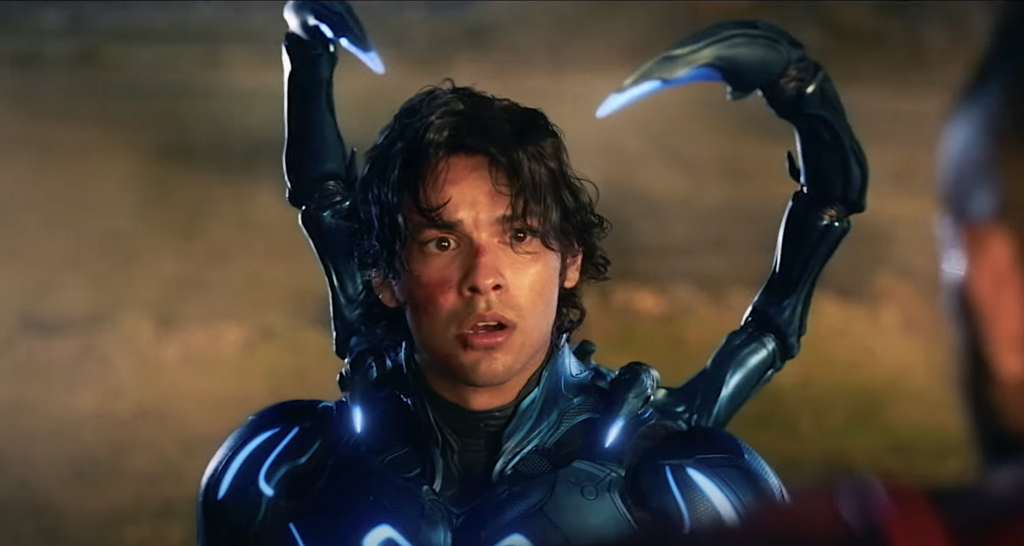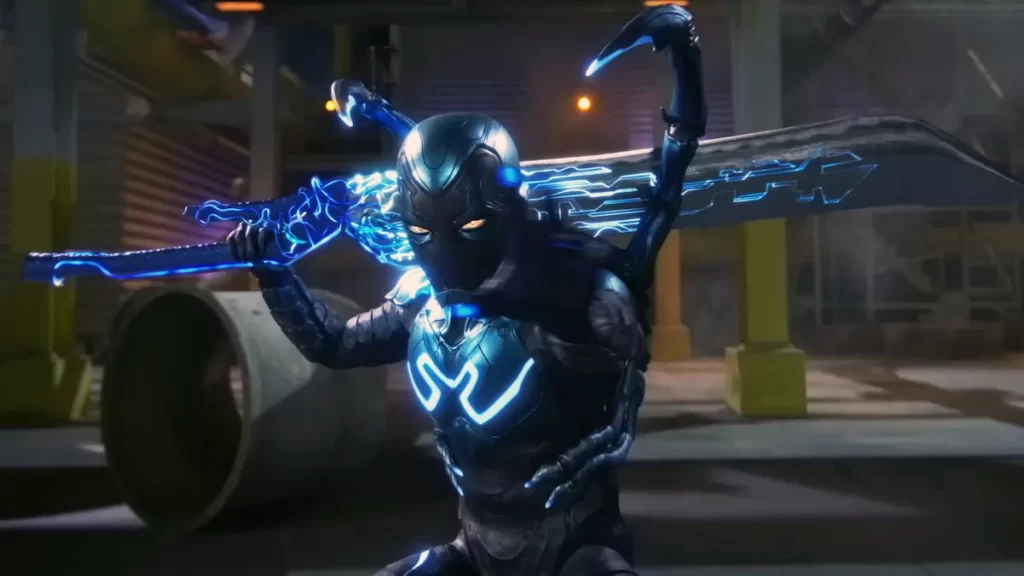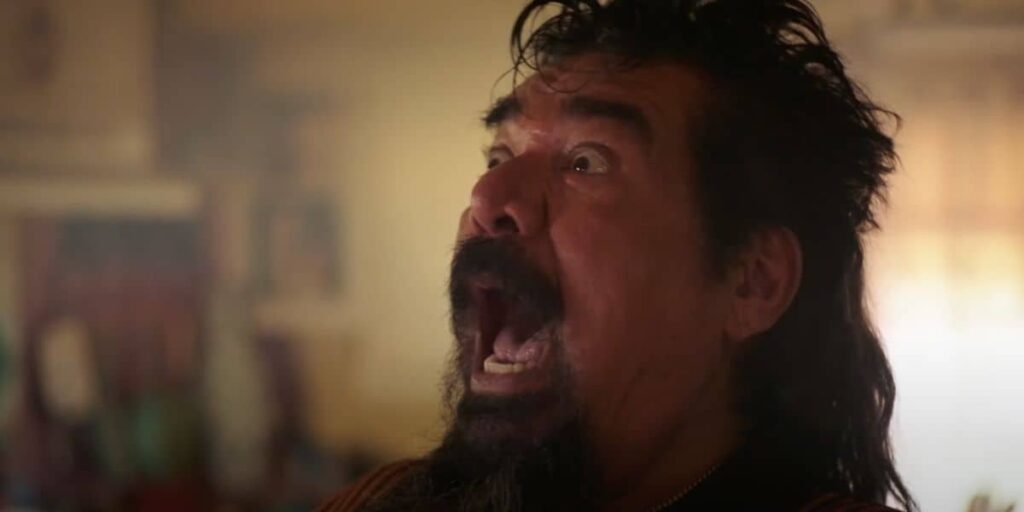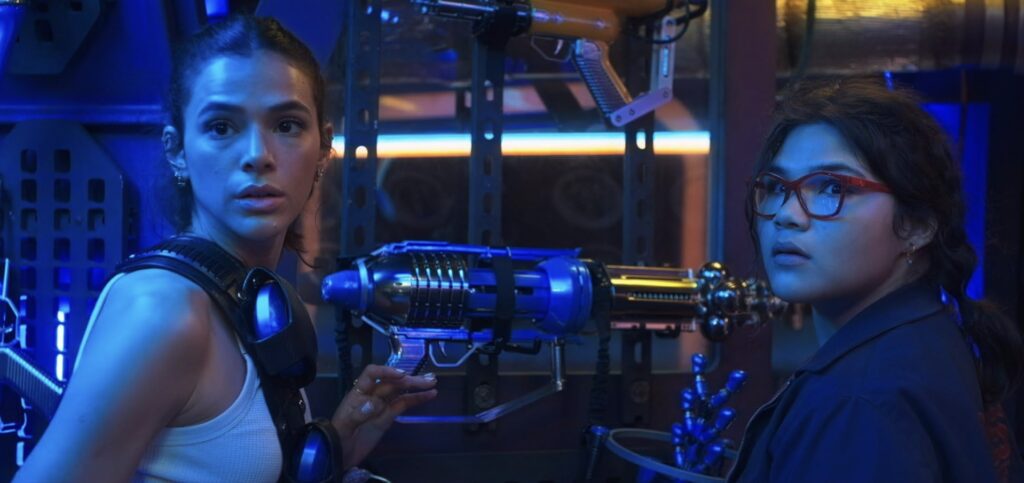
It feels reductive to label Blue Beetle “the Latinx superhero movie.” But reduction is now the superhero industrial complex’s specialty. Marvel and DC are technically competitors, but their shared universes have operated in tandem, systematically shrinking the field of blockbuster cinema into a carefully cultivated, self-sustaining formula. The studios haven’t wholly eradicated visual imagination or provocative storytelling—search for a well-made comic-book production, and you need only flip the calendar back three months—but those qualities are now secondary, subservient to the commercial imperatives of franchise continuity and fan service. Artistic personality is no longer a goal, just a potential bonus.
So yes, Blue Beetle is the Latinx superhero movie. And it’s not awful! Contrary to DC’s corporate blueprint, its main attraction isn’t its athletic showmanship, its flashy special effects, or its obligatory world-building. (Superman and the Flash, along with their fictional cities of residence, are notably name-checked, as though the script is contractually preserving the right to let its characters play with the big boys in a future sequel.) It is instead the Reyes family, a tight-knit clan of Mexican-Americans who live in a boisterous Texas enclave within the (similarly fictional) Palmera City. Bustling with activity and affection, the Reyeses are rich in love and poor in everything else. When prodigal son Jaime (Xolo Maridueña), a recent college graduate (“How do I look?” “Like you’re six figures in debt”), returns home in ostensible triumph, he encounters a parade of terrible happenings: He’s at risk of losing his ancestral house (“The landlord tripled the rent”), his father’s long-running body shop is defunct, and his now-unemployed dad (Damián Alcázar) recently suffered a small heart attack.

The screenplay, by Gareth Dunnet-Alcocer, lays out these unfortunate facts to establish the family’s marginalized status, though they mostly serve to propel the laborious plot into motion. Still, what’s interesting about the Reyeses is that they react to their misfortune not with despair, but with tranquility and optimism. They are too lively to be depressed, and their collective energy helps offset the script’s more clunky polemical tendencies. The characters aren’t exactly well-rounded, instead assuming identifying traits; Jaime’s sister (Belissa Escobedo) is the wiseacre, his mother (Elpidia Carrillo) is the pragmatist, his uncle (a hammy George Lopez) is the paranoid goofball, etc. (Adriana Barraza has perhaps too much fun as a grandmother with “a revolutionary past.”) But despite some lazy scatological humor, their familial chatter carries a natural warmth—a lived-in sensation that’s genuinely sweet.
Unfortunately, Blue Beetle is still—stop me if you’ve heard this already—the Latinx superhero movie, which means it shoehorns its homey cheer into a desultory origin story. Directed by Ángel Manuel Soto, it dutifully hits all of the preprogrammed blockbuster beats—the transformational euphoria, the sexless romance, the megalomaniacal villain, the laser-show climax in a deserted military base—with minimal flair or distinction. Armed with the opportunity to infuse real eccentricity into the DC Extended Universe (that’s still a thing, right?), Soto has instead chosen to make a superhero flick that’s as safe and anonymous as possible. He aims low.

Whether this is a consequence of studio oversight or directorial timidity is anyone’s guess. What’s clear is that Blue Beetle exhibits little interest in scribbling outside the lines. How else to explain its waste of Susan Sarandon? She plays Victoria Kord, an industrial magnate desperate to transform the magical scarab of the title—which gifts its bearer with the usual superhuman strength and speed, yadda yadda—into a lucrative contract with the armed forces. Victoria’s lack of scruples puts her at odds with her niece, Jenny (Bruna Marquezine), who’s less than enamored at the prospect of her deceased father’s beloved research company turning into Blackwater. A few story convolutions later, and Jenny is secreting the scarab in a fast-food container which she gives to Jaime, along with the ominous warning, “Don’t open it.” Surprise: He opens it.
From there, you know the drill. Jaime’s metamorphosis from jobless post-grad to mighty warrior isn’t without its minor comic pleasures; the transformation is involuntary, which allows Maridueña to vocalize panic while his spiffy cobalt suit sends him flying into outer space or through the city’s streets. (The outfit’s sentient mind is voiced with robotic functionality by the singer Becky G.) And the very conceit of the source material compels Soto to conceptualize his images; at one point, our blue hero faces off against an angry foe who’s red in more than just the face, lending some splashes of vivid color to yet another digitized brawl.
And there are, as always, far too many of those. As tired as I feel watching most putative action scenes in modern superhero movies, I have grown even more tired of complaining about them. So whatever. Sure, the action in Blue Beetle is bad—weightless, shapeless, incoherent. The question is whether its appealing cast and quippy screenplay can overcome the vague and dispiriting combat sequences that take up far too much of its 127-minute runtime.

Is it wrong if I award it points for trying? Empirically speaking, Blue Beetle is mostly lousy, with a by-the-book storyline and a flat aesthetic. But it tries hard! Or at least, its perky actors try to bring flavor to an enterprise that’s barely trying at all. Maridueña is a convincing patsy, and he and Marquezine develop a half-flirty, half-awkward chemistry that approximates actual attraction. As the sister, Escobedo is a born scene-stealer, and when he isn’t shouting about insects climbing inside orifices, Lopez brings some real charm to a stock role.
That I’m skeptical this is sufficient is an indictment of my standards, and my unwillingness to adjust my expectations for the genre. Not every comic-book movie can be Spider-Man 2, or Black Panther, or even The Batman. There’s nothing wrong with a costumed picture that hits all its marks without taking any risks—or so Warner Bros. will tell you. What’s frustrating about Blue Beetle is that its very existence is plainly meant to operate as its own defense. You can practically hear the studio suits shouting, “Hey, it’s a superhero movie and a step forward for representation, what else do you want?” Any insistence on something more—more original, more stylish, more exciting—is just proof that a bug crawled up your butt.
Grade: C+
Jeremy Beck is the editor-in-chief of MovieManifesto. He watches more movies and television than he probably should.
